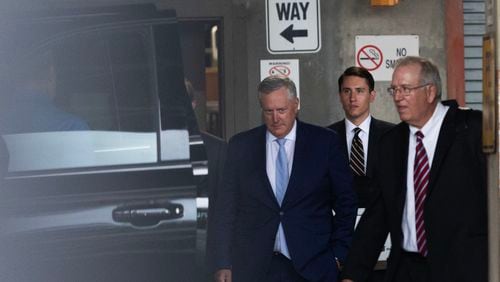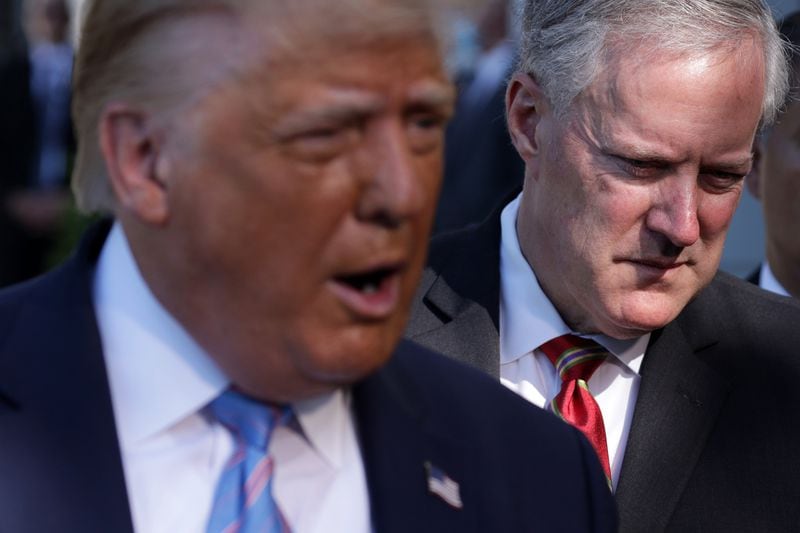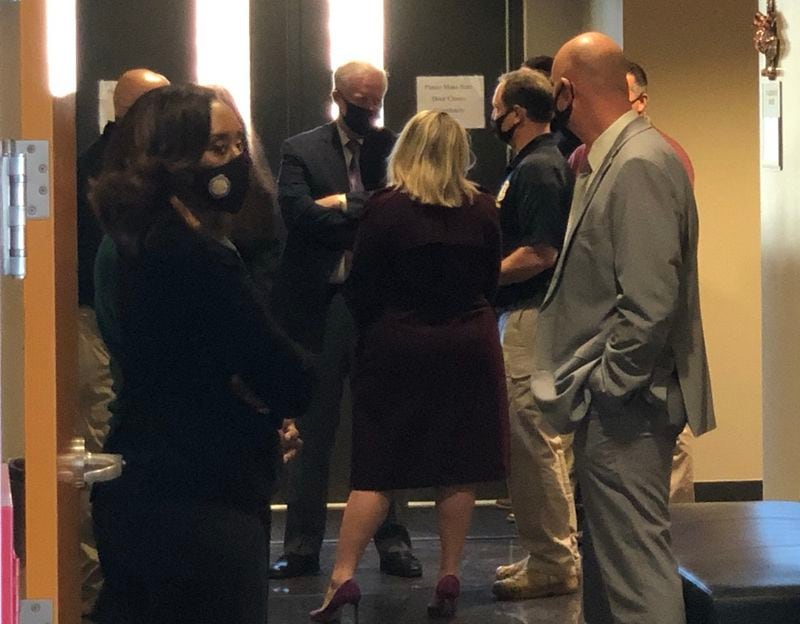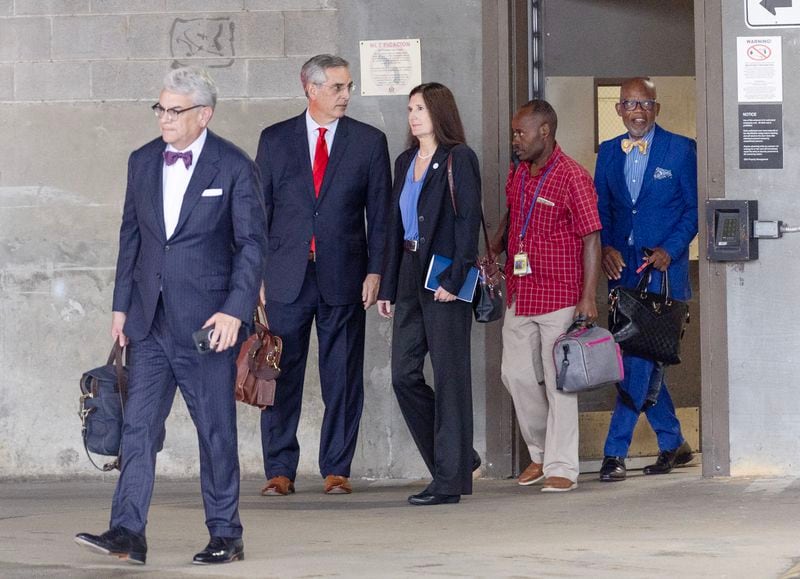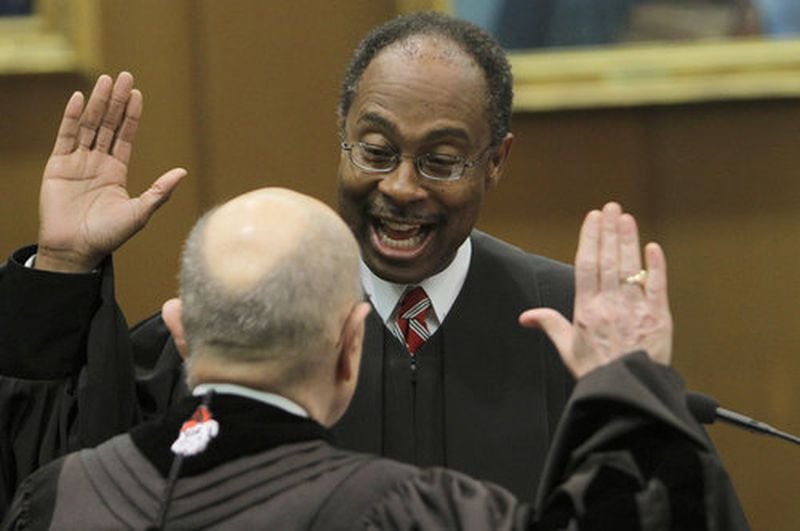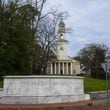Mark Meadows’s extraordinary appearance on the witness stand was just one of several big moments during Monday’s hearing in downtown Atlanta, during which the former White House chief of staff pushed to move his racketeering case from Fulton to federal court.
During the eight-hour-long hearing before U.S. District Court Judge Steve Jones, Meadows argued he was acting in his capacity as former President Donald Trump’s top White House aide when he contacted Georgia officials after the 2020 elections. Fulton prosecutors argued that Meadows was acting far outside the bounds of his federal role.
A Fulton County grand jury earlier this month charged Meadows — as well as former President Donald Trump and 17 others — with conspiring to subvert the results of the 2020 election in Georgia.
Read the Atlanta Journal-Constitution’s post-hearing dispatch here.
Here are some of the key moments from the hearing:
Meadows’ gambit
One of the biggest surprises of the day came minutes into the hearing, when Meadows’ lawyer called him as a witness. Meadows testified for roughly four hours.
Criminal defense lawyers typically avoid having their clients testify in court, since it opens them up to cross-examination by prosecutors and locks them into a version of events that could later be used against them.
But criminal defense attorney Noah Pines, who is unaffiliated with the case, said this instance is different because so much of what is alleged is documented on audio, video and social media.
“The question really is, is the conduct illegal?” said Pines. “I think everybody anticipated that (Meadows would) have to to make his case, because he has to get up there and say, yeah, I did all this stuff, but I did it in my role as a federal employee for the president.”
At times, Meadows’ struggled to answer prosecutors’ questions, or offered circuitous responses. But it’s the first time he’s testified publicly and under oath about the events following the 2020 election.
Meadows’ gambit shows the importance that the former Republican congressman is placing on so-called federal removal. His team has already disclosed in court filings that it plans to press for a federal judge to dismiss the charges if the case moves to federal court.
Even if a judge doesn’t dismiss the charges, federal court would give Meadows a broader, likely more conservative jury pool than if the case stayed in Fulton. And cameras would be barred from the courtroom.
Credit: TNS
Credit: TNS
Chief of staff’s role
One of the central disputes during Monday’s hearing was what exactly fell into Meadows’ role as chief of staff and what, if anything, fell outside of the bounds of that job.
Meadows took an expansive view. His lead attorney, George Terwilliger III, argued in his closing statement that Meadows “duties are federal operations” and that the chief functioned as Trump’s “alter ego.”
Among his primary responsibilities, Terwilliger argued, was staying abreast of the issues of the day — including election disputes — and getting a handle on what could be around the corner so the president could be properly advised and his time managed.
During the final weeks of the administration, Terwilliger said, Meadows was focused on “landing the plane” — meaning he was focused on getting Trump to accept the election results — so the administration could “get on to the peaceful transfer of power.”
Fulton prosecutors contended that Meadows’ view was overly broad. They suggested he violated the Hatch Act, which bars federal employees from engaging in political activity as part of their official roles, when he participated in calls that involved Trump campaign lawyers and offered in a text to a Secretary of State office employee to use campaign funds to pay for a requested audit of Fulton absentee ballot signatures.
Visiting Cobb County
In his testimony, Meadows shed light on his unannounced Dec. 22, 2020 visit to the Cobb County Civic Center as a state-ordered audit of absentee ballot envelope signatures was underway.
Meadows was barred from entering the room, where investigators from the GBI and Secretary of State’s office were reviewing absentee ballot envelopes to check whether voter signatures matched those on file. He instead spoke with Deputy Secretary of State Jordan Fuchs, GBI agents and then-state elections investigator Frances Watson outside the room.
On Monday, Meadows said wasn’t directed to attend by Trump or anyone else. Instead, he said he was already in metro Atlanta visiting his two adult children for the Christmas holiday and took the initiative to “anticipate questions that could come up” from Trump.
Meadows said he was “very deferential” to the state teams and simply in “fact-finding mode.” He said he reported back to Trump that the audit team had done an “outstanding job.”
Credit: Miguel.Martinezjimenez@ajc.com
Credit: Miguel.Martinezjimenez@ajc.com
Raffensperger avoiding Meadows
Later in the afternoon, Georgia Secretary of State Brad Raffensperger was called as a witness for the state and answered questions for roughly an hour.
He detailed Meadows’ multiple overtures to him in late 2020 and early 2021 — and his ultimately unsuccessful effort to avoid him.
Raffensperger said someone purporting to be Meadows reached out to him in November 2020 from a vague email address — something like N.C. congressman at gmail dot com, the secretary said — asking him to call, but it didn’t include a phone number. (Meadows was a onetime member of the U.S. House representing a western North Carolina district.) Raffensperger ignored it.
Meadows texted Raffensperger in December and also started reaching out to Fuchs, one of Raffensperger’s deputies, after he visited the Cobb audit. He even left a message on the Secretary of State’s office public voicemail line.
Raffensperger said he didn’t respond. He pointed to his tenure on the John’s Creek City Council when he was advised not to speak with parties during an active investigation. The secretary said he considered the Trump campaign’s lawsuits against him and his office akin to an investigation.
On Jan. 2, 2021, Raffensperger was interviewed by Neil Cavuto and explained to the Fox News host that Trump did not have enough votes to win Georgia.
Soon after that appearance, Meadows reached out to Fuchs and said Trump had watched the Cavuto interview and wanted to discuss the 2020 election. Raffensperger testified that he told Fuchs it wasn’t in his office’s interest to talk to Trump. After speaking with Meadows again, Fuchs relayed to Raffensperger that top White House aide was insistent. Raffensperger agreed to take the call but said it had to include the office’s counsel, Ryan Germany.
Prosecutors played a handful of excerpts from the now infamous call during Monday’s hearing.
Pre-call conversation
The other prosecution witness on Monday was Kurt Hilbert, an attorney who litigated a pair of Georgia election fraud cases on behalf of Trump and his campaign in Fulton and federal courts.
Hilbert, a Roswell-based attorney who participated in the Trump-Raffensperger call, disclosed that minutes before they called the secretary, there was a separate phone conversation involving himself, Trump, Meadows, attorney Cleta Mitchell and others. The existence of that call had not been widely reported previously.
Rhetorical ‘weakness’
Special prosecutor Anna Cross ended her cross-examination of Meadows with a bang. After Meadows said he had no role in coordinating the slates of “alternate” Trump electors in swing states like Georgia, she entered as evidence an email the former chief of staff had sent to Jason Miller, a senior Trump campaign aide, that suggested otherwise.
In the Dec. 6, 2020, email, Meadows told Miller that “we just need to have someone coordinating the electors for states.”
Meadows didn’t dispute the email, but he said that when he referred to “we,” he was describing the campaign, not himself as a part of the campaign.
Meadows’ use of “we” came up at several points during his testimony on Monday. He said he had a habit of using it frequently in his speech, a leftover habit from his years as a congressman when he didn’t want to be seen as taking all of the credit.
During his closing statement, Terwilliger described it as a “weakness in (Meadows’s) rhetoric.”
Inquisitive judge
Jones did not hesitate to question Meadows when he did not give clear answers to direct questions. At one point, Jones asked Meadows if the U.S. Constitution’s Article II, which sets the powers of the executive branch, provides a role for the president “in any state elections.” When Meadows replied he did not know, Jones said, “That’s fair.”
Jones did not hint how he would rule, though some analysts believe he sounded skeptical of Meadows.
Jones did not offer a ruling from the bench, saying that he aims to issue a ruling “as fast as possible.”
The appointee of former President Barack Obama noted that there was not much legal precedent rely on — and that his decision was likely to create precedent. He told Meadows that if he hasn’t issued a ruling before Sept. 6, the South Carolina resident should plan to get arraigned by Fulton Superior Court Judge Scott McAfee, along with the other co-defendants in the case.
A new wrinkle
In the RICO indictment, Meadows is accused of committing eight “overt acts” for the alleged criminal enterprise that sought to overturn Georgia’s 2020 presidential results.
On Tuesday, Jones made note of this in a two-page order. He asked, if “at least one (but not all) of the overt acts” attributed to Meadows is found to have occurred under the color of his office, is that enough to remove the Fulton case to federal court? He asked both sides to submit additional legal briefs addressing the issue by 5 p.m. on Thursday.

